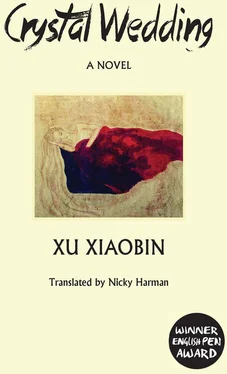Tianyi could not remember the rest of their conversation. Everything sounded distorted, and her heart was hammering so loudly she was afraid Hong would hear. She heard a voice inside her: You’ve failed , it said. Her first failure in love. It dawned on her that the man of her imaginings was a living being and could not wait for her forever, would not stay the same forever. While she spun fantasies in her head, imagining how he would come and find her one day and they would be madly in love just like when they first met, the man of her dreams had gone off in pursuit of something else entirely.
Love had tripped her up for the first time. There would be many occasions in the future when she would trip up just the same way.
T ianyi’s second boyfriend was the Secretary of the Communist Youth League in the cereals-processing factory where she worked. His name was Yingqi.
Tianyi had been working in the commune for a year when the factory job came up. By rights, she should not have been entitled to the move so soon, but at the crucial moment she wrote a begging letter to the Commune Party Secretary listing all the various difficulties her family faced and why it was imperative that she had a job that would enable her to live at home. Her eloquence proved decisive. The Party Secretary was swayed, not so much by the contents of the letter, but by the letter-writer’s undeniable literary skills. He had no idea that he had such a talented writer under his command. At commune HQ, he was surrounded by people who had been recommended as the best of their kind, but none of them came close to this writer. Secretary Sun, a chubby, fair-skinned middle-aged man, sighed as he read it, and thought of his own daughter who had been deprived of education by the ten years of the Cultural Revolution. If this girl, who signed herself Yang Tianyi, was the same age, she must have missed her schooling too, so how did she manage to write so well and with such a range of expression?
Mr Sun made a couple of calls and spoke to the heads of Tianyi’s production brigade and Propaganda Troupe about her. The general verdict was equivocal. She was sometimes prone to petty bourgeois sentimentality, for instance, she loved to sing songs like ‘Delivering the Grain’ and ‘Mangyondae’, making them sound more schmaltzy than revolutionary. It was true she had plenty of talent, she could arrange performances, she could paint, her calligraphy was good and she had a good voice. In turn, they asked the Party Secretary why he wanted to know. Was there some problem? As soon as Sun put the phone down, he remembered the girl who had sung When the Communist Party comes, the bitter turns sweet a year ago. Her voice, with its almost child-like purity had made a big impression on him. The hard-headed Party Secretary suddenly lost his head, and found himself scribbling a note on Tianyi’s letter. And so Tianyi’s fate was decided.
She became aware of Yingqi the very first day she arrived in the machine operating room of the factory. He was wearing a blue singlet, having just come off the basketball court and immediately struck her as extremely handsome: fair-skinned, deep-set eyes, a prominent nose. There was something foreign in his looks, and she later learned that his nickname was ‘the Romanian’. His politics, however, were utterly orthodox — he was secretary of the Communist Youth League — and he employed all the most up-to-date political language at the youth meetings he ran. Later, Tianyi heard about another side of him from Xiao, a young man from the popular science education group and his former classmate, who told Tianyi on the quiet: ‘If you’d only known Yingqi at middle school! We used to see him dressed in fancy, long boots, taking his dog for a walk — he was always up to something or other!’
There was an annual national art exhibition, and Tianyi took over organizing the factory’s entries as soon as she arrived. She was made directly responsible to the Youth League Secretary. He allocated her a small hut to work in, on condition that they ‘get a prize.’
Tianyi was only too happy to move into her little hut. She took up her brush and came up with creative ideas every day. In the three months the factory gave her, she joyfully let her imagination run riot. Every evening, Yingqi would find some excuse to drop by and see her. His visits gradually grew longer, from half an hour, to an hour, then three hours. When he casually asked her to paint his portrait, she could hardly refuse.
The news that the Youth League Secretary was spending most of his evenings hanging out with the girl in the little hut spread through the factory like wildfire. Yet again, Tianyi saw on the face of her fellow-workers, especially the girls, the all-too-familiar, unspeaking look she dreaded. That very year, cruel gossip had driven a girl called Lingyu to kill herself. Personally, Tianyi felt that the girls’ silent looks were more than enough to drive someone to suicide! However, Yingqi was calm and unflappable. That, in turn, made Tianyi feel she had someone to depend on and she was grateful to him for calming her. She used to wake up in the middle of the night and wonder: Is this for real? Had she found a real man at last?
When she saw him the day after those long evenings, Tianyi was embarrassed to meet his eyes, although she forced herself to put on a show of nonchalance. She began to make an effort, too, to smarten herself up. In those days where all clothing was drab, she wore brightly coloured under-garments, such as a vest with a decorative edging peeping out at the collar, or she put a hair-clip in her fringe and surreptitiously applied a bit of her mother’s old lipstick — then wiped it off again. Yingqi seemed oblivious to her efforts, though. He came every day for his ‘sitting’, posed, assuming his most ‘correct’ expression, and chatted as she painted. She did not work quickly, but she was unsure whether she was being deliberately slow.
Suddenly one day, things changed. It was 4th April 1976, right before Tomb-Sweeping Day and in Beijing people flooded into Tiananmen Square to pay their respects to beloved departed leaders like Zhou Enlai, something the government thought implied criticism of those that were now in power. Tianyi sneaked off to join them. It was drizzling, she remembered, and a young man in glasses stood on a high stone plinth and led them in singing songs. So many people braving the rain, standing on pavements running with water, no one wanting to leave. No one even put up umbrellas. Tianyi wondered if the May Fourth Movement of 1919 had been like this. ‘The blood of numberless revolutionary martyrs flowed’—that was what they had been taught as children. It had surely not been shed in vain! Her heart swelled with youthful ardour. She sang at the top of her voice; the only way to feel cleansed was to sing it out. She looked at the people next to her, and their eyes were filled with tears. She was surprised to find that she was crying too, swallowing a mixture of rainwater and salty tears.
Then, a few days later, she saw the banner headline of a newspaper editorial: ‘The Tiananmen Incident, “counter-revolutionary”!’ Her brother Tianke shoved the newspaper in front of her: ‘Look! Look! The government’s calling it “a counter-revolutionary incident”. And you’ve been going there every day! Don’t tell me you haven’t!’ She glared at him.
Her father was still alive then, although very frail. He spoke in a quavering voice: ‘Tianyi, now you listen to me. I’m your father and I’m worried sick about you, always have been! Ever since you were little, you’ve got mixed up with the wrong sort of people. You feel the back of your skull, you’ve got a ‘rebel-bone’ there, haven’t you? You mark my words, my lifetime motto has always been: ‘Prudence in all things, just like the old Imperial general Zhu Geliang’. Just remember, be prudent then you’ll always be all right!’ Tianyi nodded her head obediently. But in her heart she rebelled.
Читать дальше












